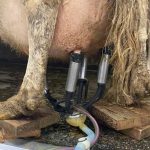
In the United States today, 96% of dairy farms are family operations, with more than 87% of those considered small family farms, made up of both family members as well as hired help. That hired help predominantly comes in the form of migrant worker—approximately 73% of non-owner farm and ranch employees in the nation.
Non-citizen migrant workers are highly trained, and as a result, have a skill set that makes them invaluable for farm operations.
This immigrant labor force also helps American consumers by helping to keep the price of dairy products low. According to a study by the Center for North American Studies, without migrant labor within the dairy industry, retail milk prices would go up as much as 90%.
Farm owners train migrant workers to use the latest technology within the agriculture industry—a particularly important move in the dairy sector, where a myriad of machines are used that help enhance sanitation and safety of the product, ensure humane and healthy interactions with the livestock, and track and optimize production for each individual animal.
Currently farmers are facing a massive labor shortage, and that impact was being largely felt before the COVID-19 pandemic changed the face of nearly every industry in the world. This labor shortage, especially within the dairy industry, is exacerbated by rules that make migrant dairy workers and sheepherders ineligible to receive H-2A visas, ultimately forcing farmers to train more people and lose valuable time and productive, competent employees in the process.
H-2A visas, also known as “Temporary Agricultural Workers” visas grant immigrants the ability to work in agriculture one year at a time with the ability to renew up to two times. This means workers have a total of three years before they must return to their country of origin and hope to become eligible to return, but likely not to the same job they were forced to leave.
Including dairy workers and sheepherders in the H-2A program, as well as extending the H-2A visa renewal period, would be extremely beneficial to our nation’s farmers, consumers and the migrant farmworkers who have helped each of the latter to make ends meet. The National Grange supports legislation to amend the Immigration and Nationality Act to expand H-2A visas and actively calls upon the Legislature and United States Citizenship and Immigration Services to revise these policies that are negatively impacting farming communities domestically.
As the dairy industry continues to find innovative ways to make milking more efficient, we cannot forget that well-trained migrant farmworkers help to make operations run smoothly, ensure high-quality animal care and provide safe consumer products. In an industry that already has an extremely high turnover rate, removing barriers for workers is in the best interest of everyone.
—Betsy E. Huber is president of the National Grange.

























